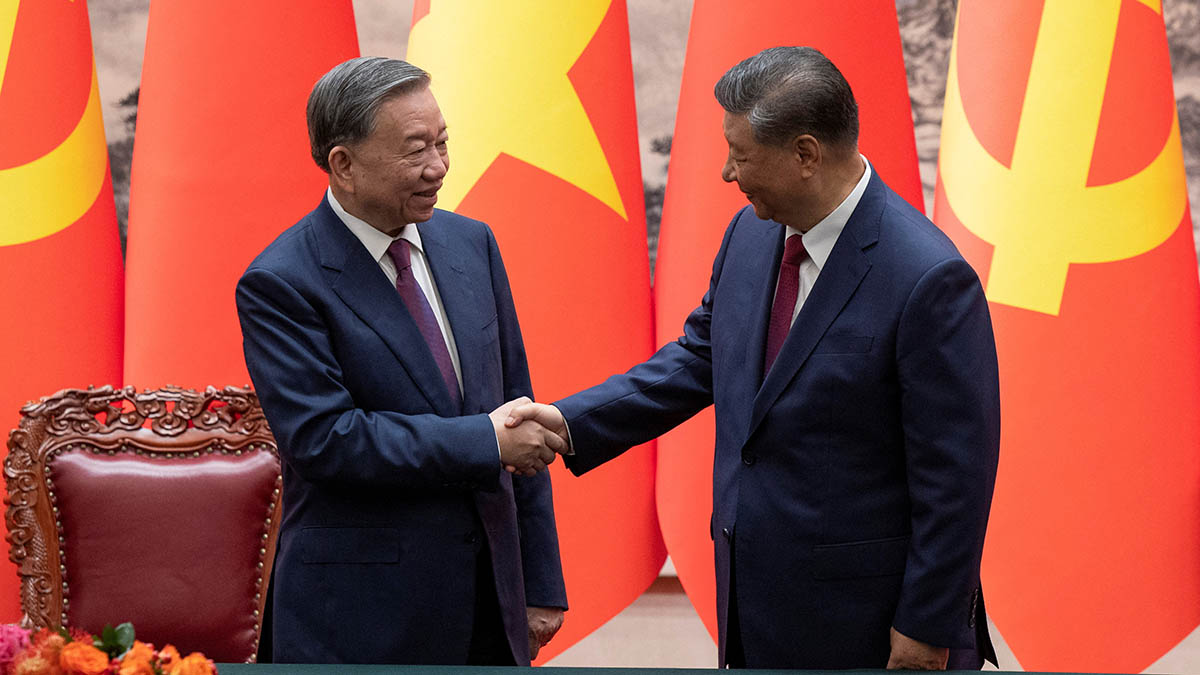Vietnam’s newly ‘elevated’ top leader, To Lam, landed in China on Sunday, for his first state visit after becoming general secretary of the ruling Communist Party. The Vietnamese President arrived in the southern Chinese province of Guangzhou on a three-day visit, where he met Chinese President Xi Jinping signalling the close ties between the two communist neighbours.
Despite the South China Sea conundrum and the resulting clashing interests, the history of the Vietnam War and shared communist ideology cement the bond between the two countries that have substantial economic and trade ties. The countries have signed bilateral and multilateral agreements, including the ASEAN-China Free Trade Agreement (ACFTA) and the Regional Comprehensive Economic Partnership (RCEP).
Even the Middle Kingdom’s nine-dash line in the South China Sea, often cited as an example of Chinese expansionism, was ‘11-dash line’, but in 1952, China gave up its claims over the Gulf of Tonkin during the time of cordial relations between Mao Zedong and Vietnam.
China could well understand the implication of the first overseas trip of the new general secretary of the Communist Party of Vietnam and aptly stated last week that Lam’s tour “fully reflects the great importance he attaches to the development of ties between both parties and countries”.
“China has always regarded Vietnam as a priority in its neighbourhood diplomacy, and supports Vietnam in adhering to the Party leadership, taking the socialist path suited to its national conditions, and deepening the cause of reforms and socialist modernisation,” Xi reportedly said during his meeting with Lam. Lam, in the same vein, said that the ties with Beijing are a top priority for Hanoi and that the visit is ‘the affirmation of the Party and the Vietnamese government to value the relation with China’.
This affirmation was quite needed as Vietnam has recently concluded a historic joint coast guard exercise with the Philippines. Also, as per the recent reports, Vietnam has accelerated the expansion of its outposts in the Spratly Islands, that too in a manner such that it “bolsters its position in relation to China, but does not pose any threat to the other main claimant in the area, the Philippines”.
Also, Hanoi upgraded ties with Washington to the highest level in September 2023, while agreeing to build a “community of shared future” with Beijing in early December.
Meanwhile, despite having overlapping claims with the Philippines — to the features in the Spratly chain — Hanoi and Manila have strengthened ties and have collectively challenged Beijing’s assertiveness in the South China Sea. While the Philippines has joined a new-security grouping in the Indo-Pacific named ‘Squad’ with the US, Australia, and Japan as the other members, and, as such, has apparently allied with the West —a step enough to raise eyebrows in Beijing, the impact of which we see on the growing tensions between the two nations in the South China Sea — Vietnam is still able to maintain the delicate balance.
All this signals to the balance, which apparently Hanoi has been able to maintain, as its economy continues to perform well. News reports show how “Vietnam enjoys big jump in exports, industrial production”. The fact that exports in July were said to have risen by 19 per cent year-on-year, while an index for industrial production rose by 11.2 per cent.
Vietnam seemingly enjoys close ties with China, has improved its relations with the US, holds joint drills with the Philippines in the South China Sea, and remains a benefactor of the West’s initiative to ‘de-risk’ or ‘de-link’ China in a quest to diversify supply chains.
Clearly, the economic and strategic planning of this southeast Asian communist nation deserves praise, till someone realises how China works — diplomatically and strategically.
Beijing, at least in rhetoric, keeps economic and territorial issues separate; also, the Chinese technique of salami slicing and its ability to reinterpret or change the terms and temper of diplomatic negotiations is quite deft and can happen at times surprisingly for the other party. Remember that when India was celebrating the rhetoric of Hindi-Chini Bhai Bhai, tensions on frontiers were growing, which ultimately led to the Himalayan debacle of 1962. Even after the Galwan incident of May 2020, when ties between New Delhi and Beijing are at lows, China advises India to keep territorial disputes separated from economic cooperation.
So, if Vietnam can be an exception to this Chinese pattern, it will be an achievement for which Hanoi will deserve appraisal. But what if the pattern continues? Can territorial issues, which otherwise are very sensitive concerning the identity and the pride of a nation, be something Hanoi can relent upon? Anyways, the future of the ties between these two ‘theoretic ideological partners’ will be worth observing in international relations.
The views expressed are personal and do not necessarily reflect those of Firstpost.
)